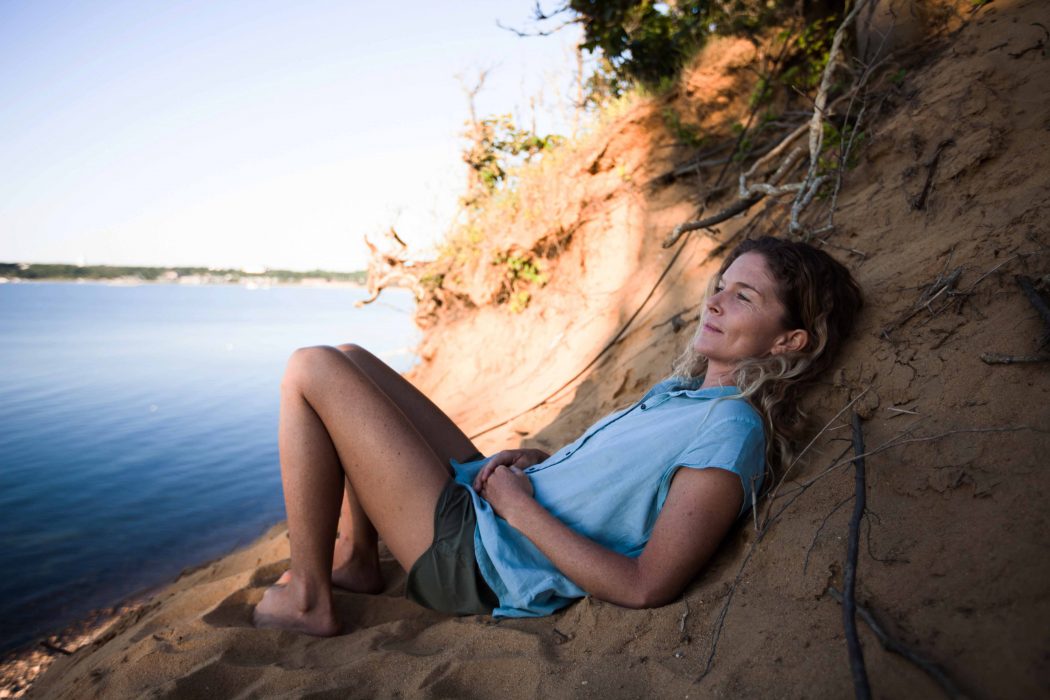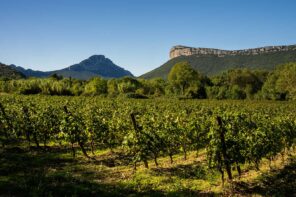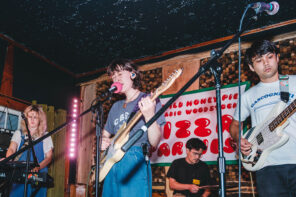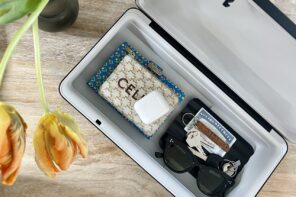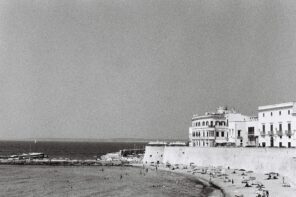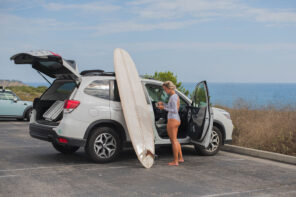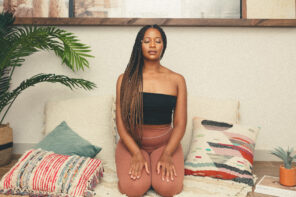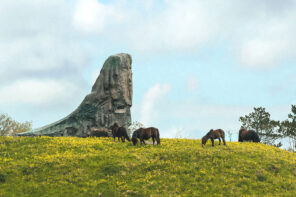The dream: living simply aboard a sailboat, floating around the South Pacific in search of beauty and swell. Captain Liz Clark has chosen to live that dream for the past decade, inspiring others around the globe to find their own path, create their own reality. That’s all lovely stuff. But what Clark’s experience actually looks on a day-to-day basis involves a lot of courage, a ton of technical knowledge and some seriously steady nerves.
The intrepid waterwoman-slash-mermaid is used to facing down squalls and chasing barrels but hadn’t been to the Big Apple. She came to New York City recently for her sponsor Patagonia as part of a tour promoting social activism and came on out to Montauk (accompanied by her very cool ping-pong-playing, beer-drinking Mom) for some R&R. We interrupted her well-deserved downtime with a bunch of nosy questions…
Living on a sailboat in the South Pacific sounds pretty glamorous. But, I’ve learned you’re also your own captain, crew, cook, mechanic, electrician, plumber, algae scraper and surf forecaster. What’s the most challenging aspect of single handing your own vessel?
The exhaustion I feel on overnight passages. At night, I can’t sleep more than fifteen minutes in a row sailing in high traffic areas. From solving broken equipment mysteries to maneuvering Swell in rough weather, I often have to do things with two hands that would be so much easier with four, and less difficult with someone to laugh with about it!
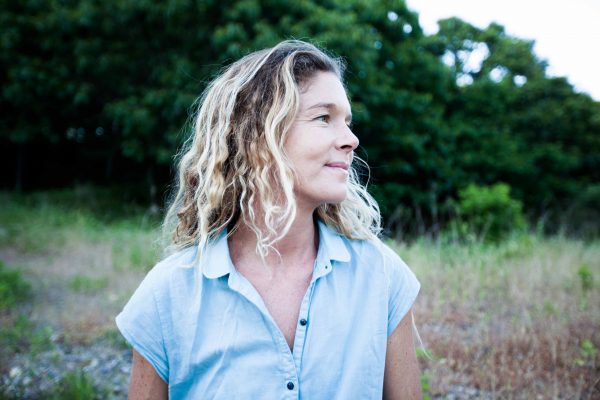
Photo: Sunny Khalsa
I will never glare at my snooze button again. Ok, what’s the one tool you can’t live without on the boat?
You need many tools if you want to survive on a boat. Choosing one makes me a little uncomfortable. [Nervous laughter.] Some tools that I always have close to me on board are my pocketknife, an array of flat blade screwdrivers, my small and medium crescent wrench, and my medium adjustable pliers.
What’s the longest stretch of time you’ve spent at sea without interacting with anyone else and what was that like?
15 days crossing from Kiribati to French Polynesia. The first six days the weather was good, and it was a wondrous time of introspection and solitude in nature. When the weather deteriorated it became a frightening, exhausting battle to make it to port–challenging to say the least. I almost lost my rig, lost communication capabilities, had no more dry clothes, and was running very low on food. Not fun at all.
That sounds flat out scary. Okay, can you share some of the most satisfying moments of your experience?
Besides the feeling of pure freedom at sea on a beautiful day; some of them would be playing with humpbacks underwater and kids I meet on land, learning to tube ride with my guru barrel expert, sharing ocean life with friends aboard, helping people in need, and preparing a celebratory feast when I’ve arrived safely to a port.
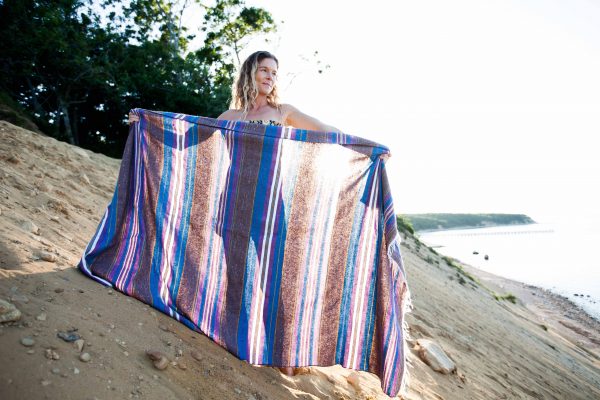
Photo: Sunny Khalsa
Simplicity demands omitting the unessential. You’ve clearly created a unique life that suits your calling and supports your passions. But sacrifices must have been made along the way. Tell us about some of those sacrifices.
Well, the biggest is probably all the time away from my family and friends back home.
The more tangible sacrifices are limited fresh-water usage, limited food options, no hot showers, no high speed internet, and limited living space. Not to mention a good night’s rest in a proper bed (for 10 years pool mats and boat cushions are as close as I’ve come to a bedspring and mattress) and constantly having to be vigilant of weather and sea conditions.
On your boat Swell you choose where to go, how to get there, and when to leave. One miscalculated decision could mean disaster. That’s a lot of pressure. How has living this way carried over into everyday decision-making?
For one, I’ve learned to trust my intuition. I don’t give in to fear very often. I know what decisions align with my beliefs and the vision I have for myself. This knowledge comes almost naturally to me now in my every-day decision-making.
Your journey has taken you to some of the most beautiful natural places on earth. How has exploring these hideaways impacted your relationship to our oceans and the Earth’s ecological balance?
Pristine oceans, vibrant coral reefs, endless vegetation…these abstractions have become my reality. Being exposed to all this natural beauty has made me fiercely protective of our Mother Earth. I feel it’s my duty to do something — anything— to spread awareness and inspire people to live with more respect for the planet. In almost every aspect of my life, I have educated myself, made choices that reflect my concerns, and try to be as conscious and accountable as possible.
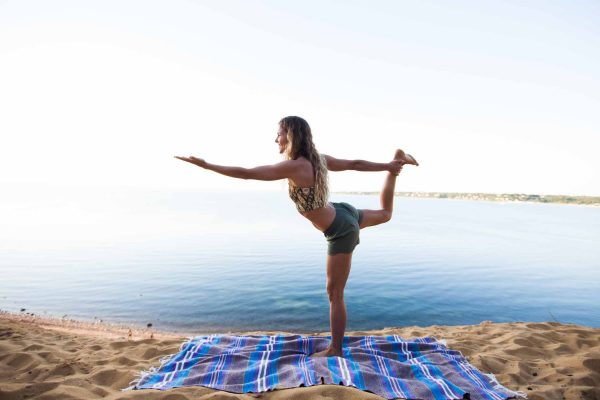
Photo: Sunny Khalsa
You’re often a long way away from a doctor, let alone a hospital. What do you do to take care of yourself to avoid critical situations?
I’ve become a true believer in preventative health care and have spent many years refining my diet, learning about natural remedies, and balancing work / play / rest. I listen to my body, taking the time to ask myself if I need to slow down. Yoga, pranayama and meditation definitely keep my body and mind balanced and able to keep up with the constant mental and physical demands on the boat.
Wim Hof’s philosophy of learning to use breathing to gain control of your central nervous system is something I’ve newly discovered and am loving. I would recommend it to anyone. And of course, when I’m surfing in remote places, I have to be a little extra careful not to hit the reef.
You’ve been out on the open sea, solo for weeks at a time. What’s the one meal that gets you most excited when getting back on land?
A salad of fresh greens. There are no leafy vegetables available out on the open ocean.
For anyone reading this under fluorescent lights, wondering how they can create a life that brings them to whatever destinations (literal and otherwise) most speak to them, what advice would you dole out?
Get to know yourself. What is it you’re passionate about? What is it you truly desire in life? How can these passions and desires shape your short and long-term goals? Get very precise in envisioning what you’d like to be doing with your life. Take small steps in that direction.
The universe has a way of opening the right doors and leading you to the right people once you become very clear about what you want. Your journey is solely yours for the taking should you have the courage to face your fears — whatever they may be.
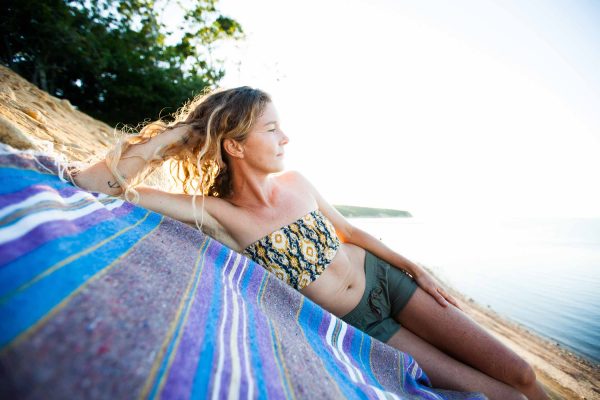
Photo: Sunny Khalsa
Okay, tell the truth. Do you ever get bored in paradise?
Never. There’s always something to do between work, play, and boat maintenance!
You just visited New York City and Montauk for the very first time. What elements stood out most? What surprised you?
I loved the intense, wild energy of self-expression in NYC. It was the first time I felt a sense of freedom in a city. I generally feel that the most in nature. But Montauk’s unique natural beauty and serenity was so soothing after 2 weeks of being ‘on the road’. I loved witnessing thriving surf culture!
Come back soon, please! In the meantime, can your mom move to Montauk so we can hang out with her more?
Be careful what you wish for; she had a blast out there!
She’d be welcome any time. Is there a place you’d be willing to call home for a year? If you don’t want to say it you can just whisper it in our ear. We won’t tell.
My lips are sealed!
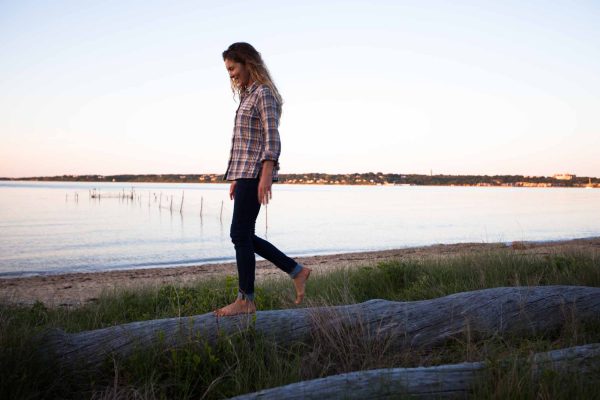
Photo: Sunny Khalsa
What’s next for Captain Liz Clark? What do you have up your rashguard sleeve?
A few projects are coming to a head. My tell-all book collaboration with Patagonia about my voyage will be released next spring. I’ll be releasing my new short film, “Steer with Your Heart” late this summer. I have some work to do on Swell’s hull in the boatyard when I get back to Tahiti. Finally, I’ll be helping jumpstart an up-cycling program with North Sails, as well as a few other grassroots organizations whose missions are chiefly focused on the environment and promoting social good.
What are you reading right now?
I ordered a copy of “The Gift” by Hafiz, because I didn’t quite have enough time with yours! Poetry is all I have time to read while finishing up the last of the book editing.
Follow Liz Clark’s voyage: @captainlizclark / Swell Voyage. All photos by Sunny Khalsa (@sunnykhalsa).

